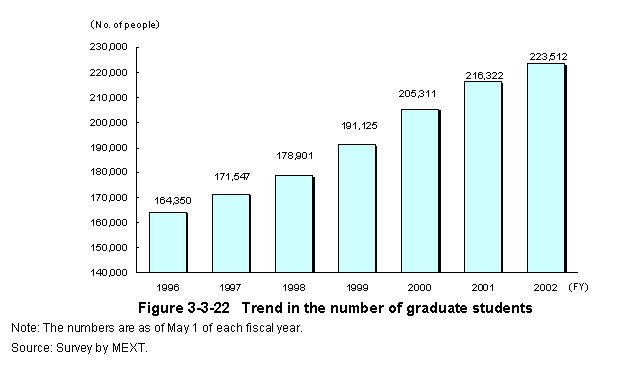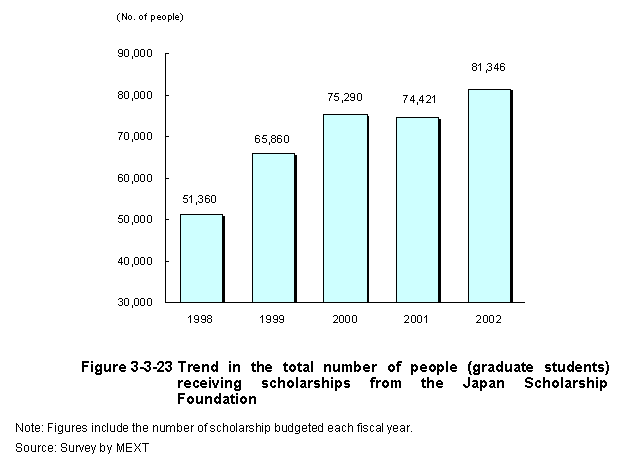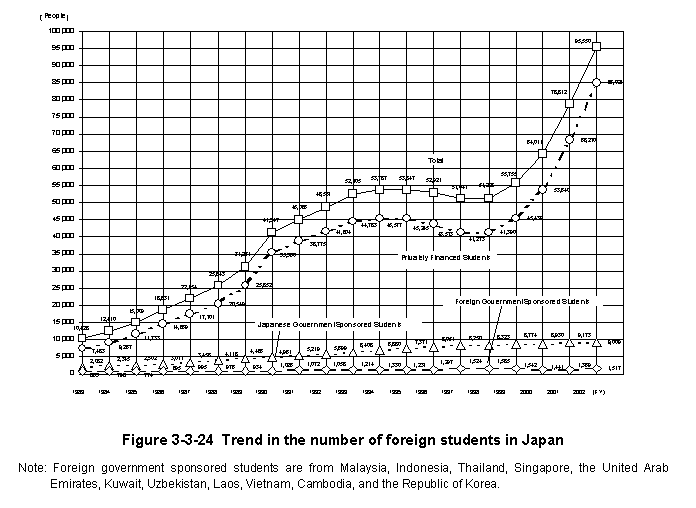| Home > Policy > White Paper, Notice, Announcement > White Paper > WHITE PAPER ON SCIENCE AND TECHNOLOGY2003 > Part3 3.3 3.3.4 3.3.4.1 | ||
| (1)Development of Researchers as the Foundation for Scientific Research at Universities,etc. |
The learning that takes place mainly at universities and colleges is an activity of intellectual creativity stretching from the humanities and social sciences all the way to the natural sciences and of aiming to search for truth,built on researchers'free way of thinking and their intellectual curiosities and creativities.
The outcomes of this learning form intellectual assets that are the common property of mankind,and constitute the infrastructures for activities and systems in industry,the economy,education,and society.In addition,the outcomes of learning form important elements for people's spiritual lives,and contribute greatly to the development of culture and the building of civilization.
Learning can thus be considered an infrastructure for sustaining and developing society and the state,and its promotion is an important responsibility for the nation.In particular,the basic elements for pro-motion of learning are to develop excellent re-searchers,to bring out the capabilities of these researchers,and to encourage them to create excellent research outcomes.In this sense,developing young researchers can be considered the infrastructure for learning,and has an extremely important significance.
| (2)Significance of Support for Young Re-searchers |
The importance of supporting young researchers can be understood when we realize that the research outcomes that win the Nobel Prize come mainly from research activities carried out when the prize-winners were in their30s or early40s.According to a survey of the111recipients of the Nobel Prizes for the three natural sciences(the Nobel Prize for Physics,the Nobel Prize for Chemistry,and the Nobel Prize for Physiology and Medicine)from1981to2000whose ages at the time of their performance meriting the award are known(out of a total of127recipients),excellent research performance leading to the Nobel Prize tended to be concentrated in the late30s,with a drop-off beginning to become apparent at around age45.
Support for young researchers,then,is significant in that appropriate support offered at the stage when the research skills of researchers are most developed can lead to the creation of excellent research outcomes.
| (3)Support for Young Researchers at Universities,etc. |
For developing researchers,it is essential to enhance support for young researchers and to assure their independence so as to help excellent young researchers bring their abilities into full play.
Consequently,work is being done to enhance the various support systems for postdoctrals based onthe"Program to Support10,000Postdoctorals,"the"Japan Scholarship Foundation's Educational Scholarship Program,"and expenditures for teaching assistants.In addition,support is being given to research assistants who enhance the research structure and to young researchers through the employment of research supporters who become necessary for fulfillment of research with competitive funding.
| (4)Support for Young Researchers through International Exchanges |
In the development of scientific and technological research,it is important to exchange opinions with other researchers who have different experiences or ways of thinking.Therefore,researcher exchanges and activities beyond national boundaries are particularly essential.
The Second Science and Technology Basic Plan,as well,in view of the internationalization of scientific and technological activities,calls for expansion of opportunities of Japanese researchers to hone competence as a researcher at overseas re-search institutions,and for increased opportunityes to interact with first-class foreign researchers,so that they can accumulate experience in international research environments from a young age.
In accordance with the plan,measures for promoting international researcher exchanges are reported by the Council for Science and Technology Committee on International Promotion of MEXT.As specific measures,the Ministry is promoting the development of young researchers from an international perspective,opening up Japan's own research systems to the outside world,and contributing to improvement of the world's re-search standards,by:(1)sending young post-doctoral researchers overseas(Postdoctoral Fellow-ships for Research Abroad:Japan Society for the Promotion of Science);(2)accepting foreign postdoctoral researchers into Japan's research institutions(Postdoctoral Fellowships for Foreign Researchers:Japan Society for Promotion of Science);(3)holding multinational seminars for young researchers(Asian Science Seminar:Japan Society for Promotion of Science);and(4)accepting young researchers at the graduate school level for short-term stays(MEXT Research Experience Fellowships for Young Foreign Re-searchers).
| 3.3.4.1.1Development of Human Re-sources at Universities and Graduate Schools |
| 3.3.4.1.1.1Development of Human Re-sources with Emphasis on Graduate Schools |
Graduate schools promote learning that centers on theoretical research,and also plays a role in developing researchers and other human resources with advanced expert skills.In Japan,about70%of the686public and private universities in Japan have graduate schools attached,for a total of508schools(as of May2002),and the total number of graduate school students at all public and private universities has been steadily increasing,to about223,512students as of May2002 (Figure3-3-22) .

With the rapid technological innovations and changes in industrial structure seen in recent years,there is more demand than ever to promote creative and advanced education and research with a focus on advanced science and technology sectors.So it is important to develop human resources with special emphasis on graduate schools.The national universities play a major role for science and engineering-oriented graduate schools,and in FY2002,a total of seven postgraduate courses were established at five universities,while39majors were newly introduced at18universities.
Additionally,in order to heighten Japan's R&D capabilities,it is also important to conduct off-campus graduate level education by utilizing the facilities,equipment,and human resources of private research institutions that have high research standards.Because of this,graduate students may receive research guidance from research institutes other than their own if their graduate school deems it educationally beneficial(Standards for Establishment of Graduate Schools,Article13).The number of collaborative graduate schools that conduct research guidance of graduate students through coordination between graduate schools and private research institutions reached91universities(both public and private)with161research courses in FY2002,and the number continues to increase year after year.Furthermore,with a view toward enhancing ties with society,57chairs have been established through donations from the private sector in32courses at19national universities as of January2003.Moreover,based on a report made by the Central Council for Education in August2002,this system has been further developed to the point of creating a system of professional schools that specialize in providing practical educations that cultivate personnel who possesses high level,professional occupational skills.
| 3.3.4.1.1.2Development of Science and Engineering-Related Human Resources |
In order to resolve the diverse problems con-fronting modern society,and in order to open the path towards a prosperous future society,Japan must create new science and technology.
In addition,Japan is expected to exhibit still more leadership and creativity,and to contribute further to international society,toward the goal of becoming a nation of creative science and technology.To support such efforts,it is extremely important for Japan to develop richly creative human resources in the science and engineering fields.
Additionally,it is necessary to strive for the growth of the manufacturing industry,which serves as a vital lifeline for Japan,and thus to promote the fostering of practically-oriented personnel in order to support fundamental technologies for manufacturing.
For these reasons,the Ministry of Education,Culture,Sports,Science,and Technology promoted measures in FY2002 that include:(1)reorganization and reform of undergraduate courses of study,and establishment of new graduate school research courses and majors;(2)upgrading and modernization of experiment and training equipment in science and engineering departments;(3)support to universities that develop and implement education programs to stimulate the creativity of students,and implement hands-on pre-admission programs that actively disseminate information to youths and society concerning the appeal of science and engineering-related fields;(4)internships for students to gain hands-on experience working at manufacturing sites,etc.;and(5)development of venture business laboratories for the purpose of developing people with a rich entrepreneurial spirit.
| 3.3.4.1.1.3Promotion of Wider-view Education |
With the continuing progress and complexity of our society,it is critical for universities to provide wider-view education.This is because university students of any major subject must be encouraged to respond independently to changes,look for their own future challenges,and develop the capabilities to take on challenges and make flexible and comprehensive judgments from wider perspectives.
For this reason,the Ministry of Education,Culture,Sports,Science and Technology in FY2001 is supporting the active promotion of general education by universities through the implementation of necessary measures such as budgetary arrangements and information sharing,with the aim of expanding such education at universities.Universities are actively promoting general education courses by establishing courses of study with interdisciplinary and comprehensive content,as well as establishing classroom study incorporating internships and volunteer activities.
| 3.3.4.1.1.4Support for Graduate Students |
To develop an environment where exceptional graduate students can confidently proceed with their education,the Ministry of Education,Culture,Sports,Science and Technology works to support students in a number of ways,including expansion of research scholarships provided by the"Research Fellowships for Young Scientists Program"of the Japan Society for the Promotion of Science(JSPS).Another is the expansion of teaching assistant(TA)programs for graduate students who excel.By having the TAs run educational assistance programs out of the educational concern of the Ministry,TA programs provide training opportunities to graduate students who will become future teachers and researchers and help assure undergraduate students receive individual and careful attention from their teachers.The Ministry also works to expand the scholarship program of the Japan Scholarship Foundation,which loans scholarships to exceptional students who need financial assistance with their studies in order to nurture personnel with the will and abilities to lead the next generation (Figure3-3-23) .

In addition,research assistants are also promoted.Students with advanced standing in doctoral programs at graduate schools are made to participate in high-profile research projects undertaken by national and private universities and joint-use university facilities.This develops the students'abilities in carrying out research and also enhances the research system.
Moreover,to promote the research of scientists who have obtained competitive funding,the competitive funding system is being revised so as to allow the employment of doctoral students as a research expense.It is expected that the young re-searchers will develop into full-fledged re-searchers through participation in this research.By making it widely known that in the future competitive funding can be used for employment and by expanding competitive funding,it is expected that employment will increase even more,contributing to the training of young researchers.
| 3.3.4.1.1.5Assistance for Foreign Students |
The number of foreign students enrolled in Japanese institutions of higher education reached about96,000including about26,000graduate students,as of May1st,2002. (Figure3-3-24) .

To ensure that foreign students can keep on being engaged in education and research activities without anxiety,it is necessary that adequate assistance should be provided for them.
Built upon the"The Declaration Concerning Foreign Students Policy towards the21st Century in1983,the Ministry of Education,Culture,Sports,Science and Technology is looking to accept100,000foreign students in the beginning of the21st century.Based on the"Plan to Accept100,000Foreign Students,"MEXT continues to strive to improve the quality of the foreign student environment by taking such means as anticipated preparation for the entrance of Japanese government scholarship(Monbukagakusho scholarship)students,expansion of honors scholarships for privately financed foreign students and pre-college students,improvement of the system of educational supervision for foreign students(special courses in English for foreign students at graduate schools),and guarantees for student housing.
The promotion of these measures resulted in good prospects of achieving the"Plan to Accept100,000Foreign Students"during the current fiscal year.As a result,the Foreign Student Section(Chairman:Tsutomu Kimura,President,National Institution for Academic Degrees and University Evaluation)was newly established in November2002under the auspices of the Subdivision on University of the Central Council for Education,and considerations have now turned toward formulating new policies for foreign students.
| 3.3.4.1.2Development of Human Resources at Colleges of Technology |
Colleges of technology were established as institutions for higher learning that implement five-year programs designed to develop human resources with practical skills.The education results produced by these colleges of technology have been highly praised by industry and other corners.To fulfill the critical role of these educational institutes designed to develop practically skilled personnel with a rich capacity for creativity,the Ministry of Education,Culture,Sports,Science and Technology is striving to(1)upgrade education and research activities such as improving curriculums and educational techniques,etc.,as well as promoting coordination with industry and increasing expenditures directed at advanced manufacturing activities such as the manufacturing of robots,(2)establish new majors in order to respond to advancements in science and technology,and(3)promote the reorganization of courses of study in order to appropriately respond to societal demands,and to develop and expand upon these courses of study.
| 3.3.4.1.3Development of Human Resources at Specialized Training Colleges |
In order to develop specialists and entrepreneurs in information technology-related fields at Specialized training colleges,the Ministry of Education,Culture,Sports,Science,and Technology is implementing measures to upgrade the content of vocational education,including development of programs in cooperation with industry and pro-vision of financial assistance for the development of large-size education equipment and information processing-related facilities,so as to promote a more practically oriented vocational education and specialized technical education.
| 3.3.4.1.4Development of Human Resources at High Schools |
Along with newly designating"Super Science High Schools,"where curriculums that emphasize science and mathematics are being studied and developed,efforts for the planned development and expansion of science education equipment such as experimental equipment in schools are now in progress.Moreover,efforts are being taken to expand facilities and equipment for experimentation and practice,to promote industrial education that responds appropriately to changes in society.
| Back to Top | MEXT HOME |